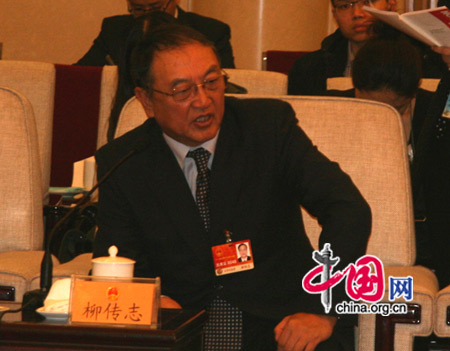China's CEOs seek lower taxes at NPC session
Corporate leaders attending a sideline meeting Sunday at the annual National People's Congress (NPC) sought reductions in business taxes in order to shoulder the increasing cost of employee benefits.
|
 |
|
Liu Chuanzhi, chairman and president of Legend Holdings Ltd., chairman of the Board of Directors of Lenovo speaks at a sideline meeting during the annual National People's Congress (NPC) in Beijing, March 6, 2010. [China.org.cn] |
Liu Chuanzhi, chairman and president of Legend Holdings, Ltd., and chairman of the Board of Directors of Lenovo, raised the issue at Sunday's meeting to discuss potential tax adjustments. During the meeting Li Fucheng, president of the Beijing Yanjing Beer Group Corporation, echoed Liu's call for tax policies supportive to businesses.
"Tax cuts will help businesses to do more for their employees. Big businesses can set up enterprise annuities so that their employees can get more benefits after retirement. [Increased benefits] in turn will help increase ordinary people's consumer capacity and boost domestic demand. As China develops into the world's fastest growing consumer market, it will provide great business opportunities for both [domestic] and foreign businesses," Liu said.
Some small and medium-sized enterprises (SMEs), Liu added, cannot even afford to buy social insurance for their employees due to the increasingly heavy tax burden. Li argued that high taxes were limiting his company's ability to be profitable.
According to Li Fucheng, last year Yanjing Beer paid 2.45 billion yuan in taxes "Our profits were only about 1.5 billion yuan. Taxes have become a rather heavy burden to us," Li complained.
According to data released by the Ministry of Finance and the National Bureau of Statistics in January 2011, China's national fiscal revenues grew by 21.3 percent and GDP grew by 10.3 percent over the past year. Fiscal revenue growth exceeded GDP growth and outpaced growth of ordinary people's incomes.
 0
0 






